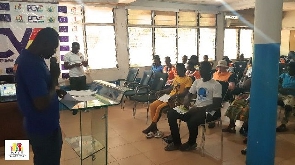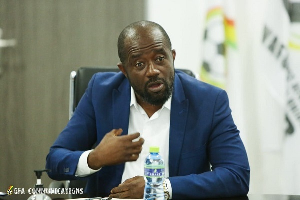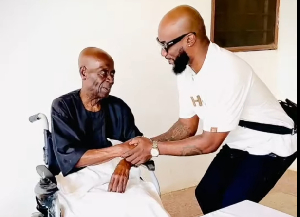The National Commission for Civic Education (NCCE) for Builsa North Municipality, successfully held a youth engagement session at the Municipal Assembly Hall in Sandema.
The youth engagement forms part of a European Union-funded project on preventing and containing violent extremism (PCVE) in the Northern area of Ghana.
The event that took place on Tuesday June 27 2023, brought together a cross-section of the youth in the municipality. The District Police Command and the Office of the Justice and Peace Commission in the Wiaga Deanery were the key stakeholders present as resource persons for the exercise.
The NCCE in 2023 conducted a baseline survey on preventing and containing violent extremism in Northern Ghana where the youth formed a greater proportion of the respondents. Stemming from this, the Municipal NCCE director; Jeffery Addah in his address shared that, engagement with the youth was necessary for the fight against violent extremism as they are the most vulnerable and susceptible to recruitment into extremist groups.
He added that the main objective of the project was to prevent and contain violent extremism through the promotion of social cohesion, peace and tolerance in the five northern regions and other hotspots in Ghana.
The Builsa North NCCE directorate also pledged to work closely with all religious bodies and communities to create public awareness of the values of mutual trust, tolerance, confidence building, negotiation, mediation and dialogue considering cultural diversities.
He concluded by appealing to traditional leaders to also employ local mechanisms of maintaining peace and peaceful co-existence between and among communities and ethnic groups. The NCCE director acknowledged the tremendous support of the European Union (EU) over the years and in the current project to equip the youth with relevant information on violent extremism and radicalism.
The District Superintendent of the Ghana Police Service for Builsa North; DSP Kwesi Amankwah speaking at the event as a resource person, led a session on the theme “Preventing Violent Extremism in Ghana”.
He educated participants on the Terrorism Act, tactics and weapons used by terrorists, possible signs of radicalization, and how to identify and report suspicious persons and items. Participants also had firsthand information on how some protective security measures to take and what to do during attacks. DSP Kwesi Amankwah invited participants to form or be part of community surveillance groups in conjunction with the Ghana Police Service to soar up security efforts.
PP Baba Apaabey, the former Upper East Regional NCCE director and the current President of the Justice and Peace Commission for the Wiaga Deanery led the final session on “Peace Building Mechanisms and National Cohesion”.
Using illustrative examples, his session covered the key terms of the theme, triggers of peace, gender dimensions and Social cohesion. Reiterating the need for good governance, resource equity and low level of corruption as fundamental requisites to ensure peace in communities in Ghana.
Lauding the Municipal NCCE for the youth engagement, he concluded on the need for ongoing public education and socialization as strategies that promote social cohesion.
Resource persons responded to the questions and concerns of the participants at the end of the session.
Youth leaders present, finally pledged their commitment to the fight against violent extremism with a communique on practical steps they will take after the session in their various communities.
Regional News of Thursday, 29 June 2023
Source: Atuimah Valerius

















